The following is a transcript with source hyperlinks and slides of the May 23, 2023 IRmep education outreach livestream broadcast on YouTube, archived commercial free video on Vimeo, and also available as an audio episode of the Israel Lobby Damage Assessment on most major podcast platforms such as Spotify and also Audacy, Player.FM and iHeart.
Hello and welcome! I’m Grant Smith, Research Director of IRmep. May 23, today, is a historic day although most people don’t know it. 60 years ago today the U.S Senate Foreign Relations Committee documented $60 million dollars in Israeli and foreign funding was laundered into the U.S to create the foreign influence operation today known as APAC.
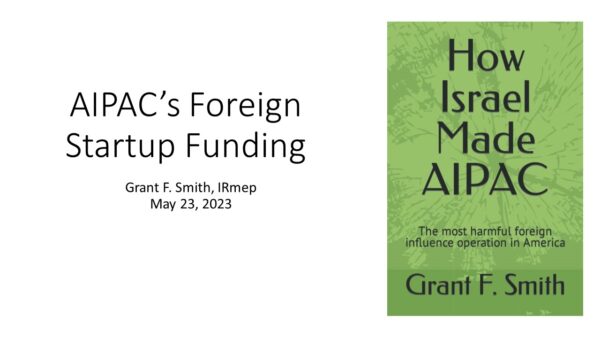
I’d like to go through the historic record of that clandestine operation, its exposure and how it’s ongoing reconstitution negatively impacts America. The information I’m presenting today is drawn from the book “How Israel Made AIPAC: The Most Harmful Foreign Influence Operation in America” and the sequence is going to be first, the Senate investigation of Jewish Agency money laundering into the U.S. Then, why did the Senate Foreign Relations Committee investigate? What Israel and the Jewish Agency were trying to accomplish in the U.S. How the lobby has reconstituted over time and how it’s presently structured to serve as a foreign influence operation.
At the end I’ll try to take some questions.
I’m going to be quoting a fair amount of historic document text and even from the book as we go through this mainly for the benefit of audio-only podcast listeners.
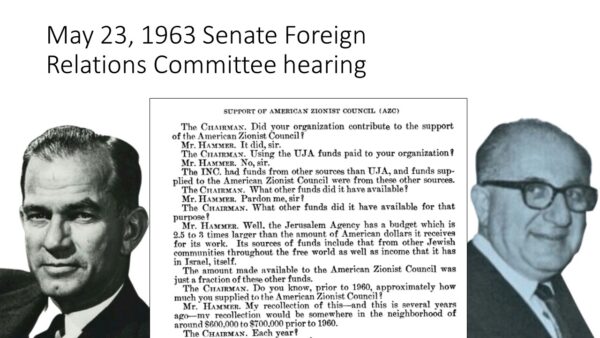
On May 23, 1963 Gottlieb Hammer, who was the leader of the Jewish Agency for Israel and Senator J.W Fulbright, Arkansas Democrat and Chair of the Senate Foreign Relations Committee, had the following exchange during hearings on the activities of non-diplomatic foreign agents in the United States.
Fulbright: Did your organization contribute to the support of the American Zionist Council?
Gottlieb Hammer: It did, sir.
Fulbright: Using the United Jewish Appeals funds paid to your organization?
Hammer: No sir. The [Jewish Agency] corporation had funds from other sources than UJA and funds supplied to the American Zionist Council were from these other sources.
Fulbright: What other funds did it have available?
Hammer: Well, the Jewish Agency has a budget which is two and a half to three times larger than the amount of American dollars it receives for its work its sources of funds include that from other Jewish communities throughout the Free World as well as income that it has in Israel itself. The amount made available to the American Zionist Council is just a fraction of these other funds.
Senate record
Hammer subsequently furnished the Senate Foreign Relations Committee with a series of financial accounts showing the total amounts by year of foreign funding the Jewish Agency was moving into the United States with zero disclosure of its end recipients for influence, lobbying and public relations between 1955 and 1962.
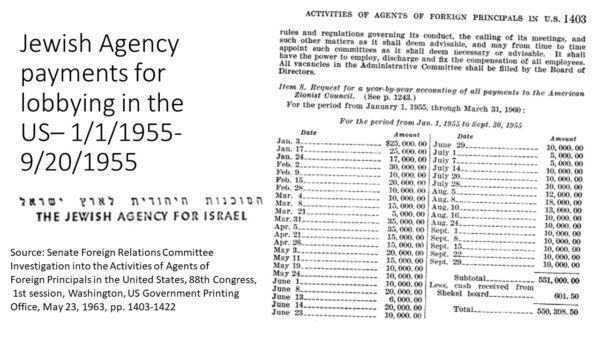
For example, on January 3 of 1955 the Jewish Agency sent $25 000 for lobbying, diplomatic support, and special treatment of Israel in the United States. The total for the 1955 report was $550,308 dollars and fifty cents.
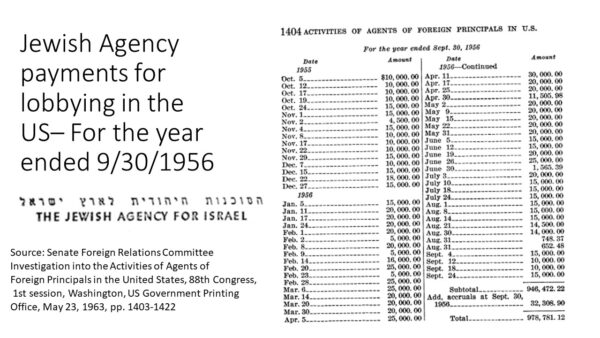
In 1956 the Jewish Agency total spending was nine hundred and seventy-nine thousand.
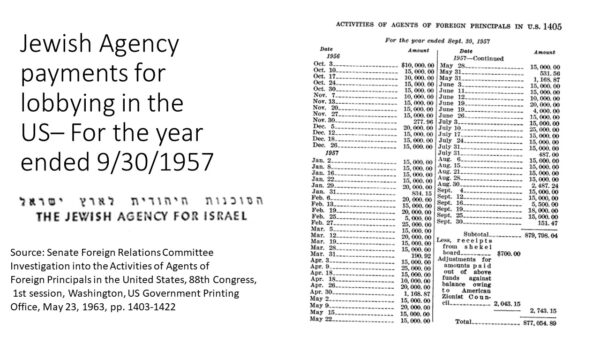
In 1957 the total spend was $877,000.
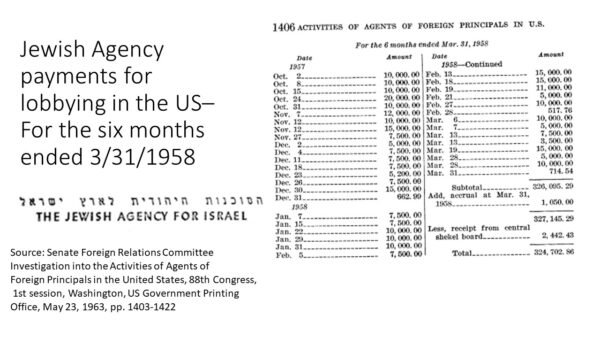
In 1958 the Jewish Agency total spend was $325,000…
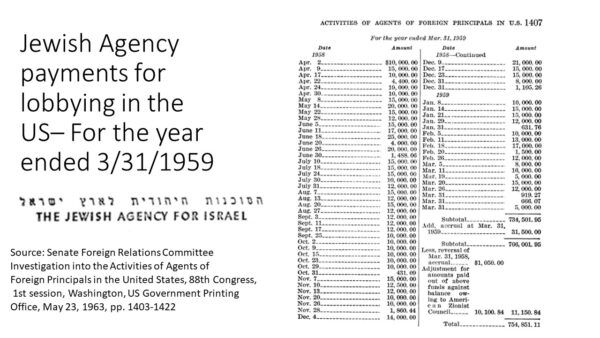
but in 1959 it soared to $754,000.
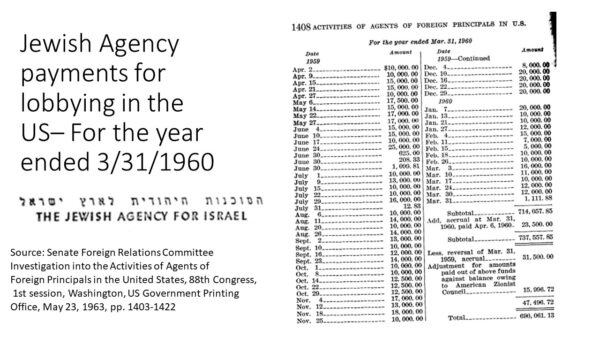
And in 1960 the Jewish Agency total spend was $690,000.
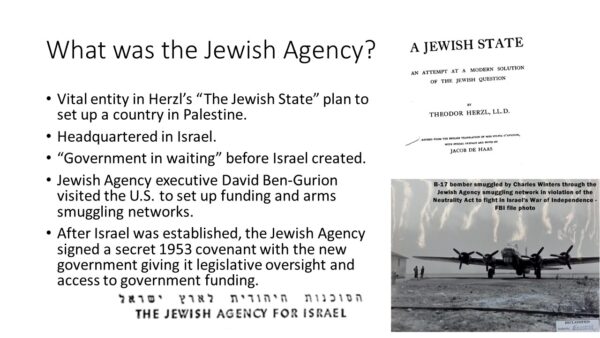
But what exactly was the Jewish Agency for Israel? It was one of the most vital entities named for creating a Jewish State listed in Theodore Herzl’s Zionist manifesto “The Jewish State.” It was designed to facilitate the transfer of Jews and their properties to a new state in Palestine. It was kind of a government-in-waiting before Israel was created. In fact, Jewish Agency executive David Ben-Gurion visited the U.S to send up a funding and arms smuggling network to create that state and after Israel was established, the Jewish Agency signed a secret 1953 “Covenant” with the new government giving it legislative oversight and access to government funding.
There’s a picture of a B-17 bomber being smuggled through the Jewish Agency arms network. Anyway, the obvious question is, what was the American Zionist Council getting for all of this Jewish Agency funding?
Well, the AZC was Israel’s foreign influence node. But it’s also somewhat unimportant to focus on an organization rather than the indispensable role that it played and we’ll get to that in a bit.
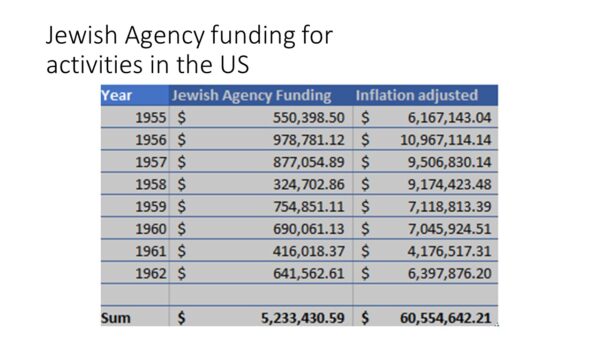
Taken individually the annual Jewish Agency payments may seem small by today’s standards. However, by adjusting each report’s spending for inflation, to today’s dollars, we can see the amount was quite substantial totaling just over $60 million dollars.
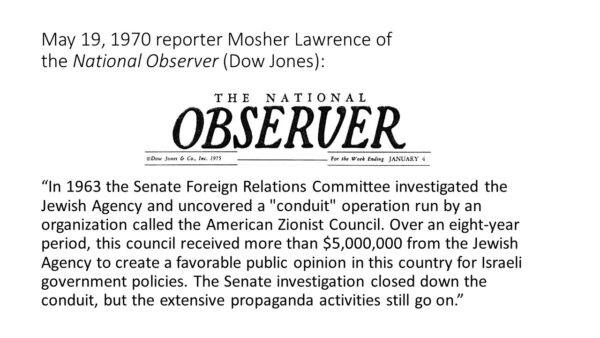
Unsurprisingly, there appears to be only one mainstream news report totaling up this clandestine funding, seven years after the fact, from the now-defunct Dow Jones National Observer newspaper. It read,
“In 1963 the Senate Foreign Relations Committee investigated the Jewish Agency and uncovered a conduit operation by an organization called the American Zionist Council. Over an eight-year period this Council received more than five million dollars from the Jewish Agency to create favorable public opinion in this country for Israeli government policies. The Senate investigation closed down the conduit but the extensive propaganda activities still go on.”
The National Observer
Various Jewish publications, including one emanating from the American Council for Judaism, a non-Zionist interest group, not only covered the story but (ACJ) heavily involved itself in organized opposition to foreign funding from Israel entering U.S politics. So why was the Senate having hearings into Jewish Agency spending on lobbying in the United States?
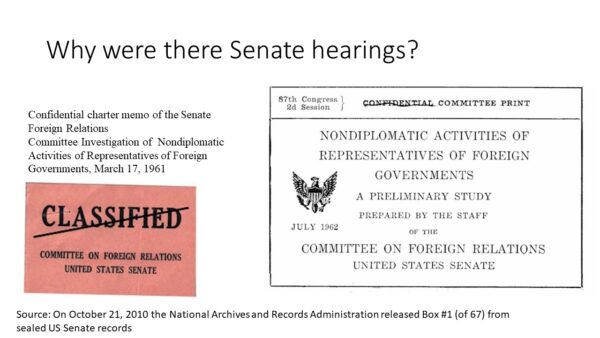
In the 1950s and 60s Congress was feeling growing pressure to comply with Israeli government demands for weapons, money and diplomatic support from U.S front organizations and wanted to know more about where the funding and direction was coming from. The Senate Foreign Relations Committee drafted a classified secret “Charter Memo” for investigative hearings in 1961. But the National Archives and Records Administration didn’t release box number one of a total of 67 where the memo resided until October 21 of 2010. The sections I’ve highlighted in yellow reveal the Senate was heavily focused on the massive flows of clandestine funding going into the U.S to influence policy and perceptions about Israel.
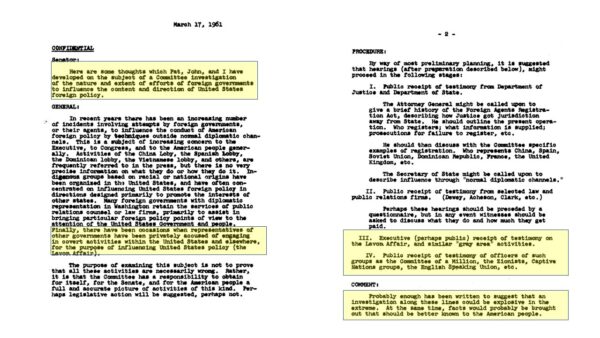
The memo mentioned specifically an Israeli terrorist attack on the United States as driving the need for hearings and action. In 1954 the Israeli government launched “Operation Susannah,” a false-flag terrorist attack on U.S facilities in Egypt. But Israel’s operatives were quickly arrested when bombs exploded prematurely. The false flag operation’s objective in attacking U.S facilities was to keep U.S troops stationed in the Suez Canal Zone, apparently responding to “Egyptian militants” and drop support for the transfer of the canal to Egypt.
The terror operation’s utter failure resulted in a political crisis known as the “Lavon Affair.” The Senate Foreign Relations Committee investigative charter worries “there have been occasions when representatives of other governments have been privately accused of engaging in covert activities within the United States and elsewhere for the purpose of influencing U.S policy. (the Lavon Affair).”
The charter proposed “executive receipt of testimony on the Lavon Affair and similar gray area activities.” The charter was aware of the risks involved investigating Israeli covert actions against the U.S It said “ an investigation along these lines could be explosive in the extreme. At the same time facts would probably be brought out that should be better known to the American people.”
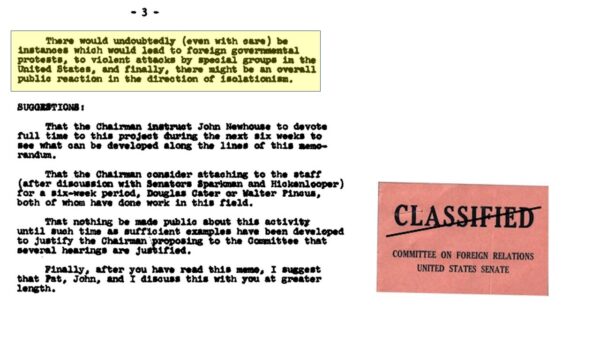
The fear of actual attacks on the U.S were expressed in the final page of the charter, “there would undoubtedly even with care be instances which would lead to foreign governmental protests to violent attacks by special groups in the United States. And finally, there might be an overall public reaction in the direction of isolationism.”
Peppered throughout was a desire for secrecy until the hearing was ready to launch. This is why the Senate Foreign Relations Committee investigated on May 23, so many years ago.
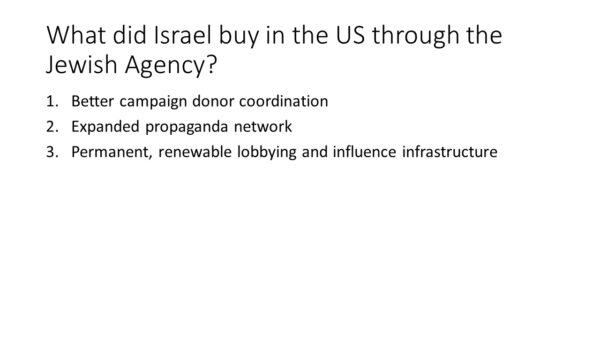
But what was the Israeli government trying to buy in the U.S through the Jewish Agency? Basically, three things. Better campaign donor coordination. An expanded robust propaganda network. And a permanent lobbying and influence infrastructure.
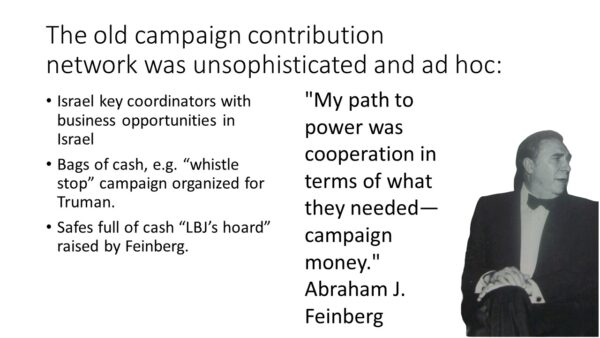
The old campaign contribution network was fairly unsophisticated and ad hoc. For example, Abraham Feinberg was a long-term foreign agent for Israeli arms smuggling from the U.S and clandestine influence operations including securing [funding for] the Israeli nuclear weapons development program. Israel even gave him the Coca-Cola franchise in Israel where he held 60 percent of the shares.
He was under constant FBI surveillance but was untouchable because he was so close to U.S presidents. It was Feinberg who arranged the bags of cash that refueled Harry S Truman’s “Whistle Stop” campaign tour for the presidency, which Truman rewarded by instantly recognizing Israel when it declared statehood. Feinberg was later responsible for filling an entire safe full of cash for the use of Lyndon Baines Johnson.
But the “bundles of cash for influence” operation was clumsy.
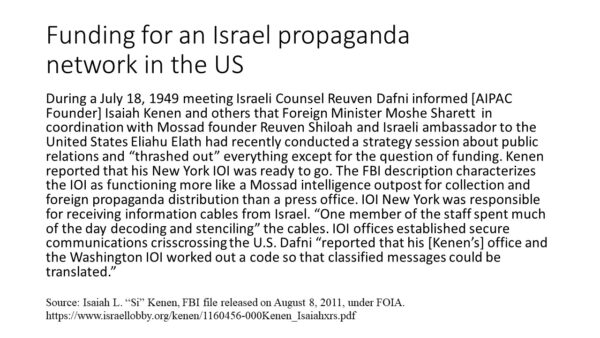
Also, setting up a vast propaganda network in the U.S with Jewish Agency funding was the solution to a propaganda problem identified long ago by the future American Israel Public Affairs Committee [AIPAC] founder Isaiah Kenen, the Israeli ambassador and the founder of the Mossad, the Israeli intelligence service. And bear with me as I summarize FBI reports about their solution to the funding problem.
During a July 18, 1949 meeting Israeli counsel Reuben Dafni and future AIPAC founder Isaiah Kenen and others that foreign minister Moshe Sharett in coordination with Mossad founder Reuven Shiloah and the Israeli ambassador to the United States, had recently conducted a strategy session about public relations and “thrashed out” everything except for the question of funding.
Kenen reported that his New York office was ready to go. An FBI description characterizes Kenen’s office as functioning much more like a Mossad intelligence outpost for collection and foreign propaganda distribution than a traditional press office. Kenen’s New York office was responsible for receiving information cables from Israel. The FBI noted “that one member of the staff spent much of the day decoding and stenciling“ the cables. A network of offices established secure communications crisscrossing the U.S. Israel Counsel Dafni “reported that his [Isaiah Kenen’s] office and the Washington Branch worked out a code so that classified messages could be translated.”
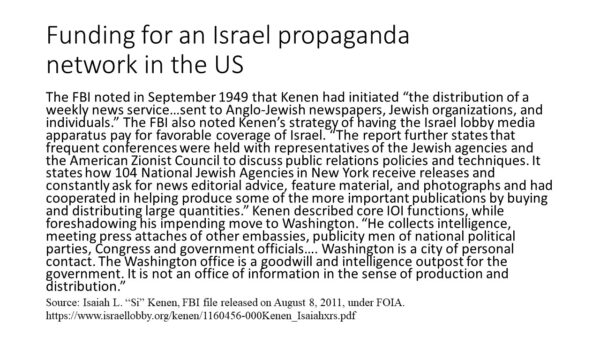
The FBI further noted in September 1949 that Kenen had initiated “ the distribution of a weekly news service sent to Anglo-Jewish newspapers, Jewish organizations and individuals.” The FBI wrote Kenen’s strategy of paying for favorable coverage of Israel was rampant. The report further states that frequent conferences were held with representatives of “Jewish agencies and the American Zionist Council to discuss public relations policies and techniques—104 National Jewish agencies in New York received releases and constantly asked for news editorial advice, feature material and photographs and then cooperated in helping produce some of the more important publications by buying and distributing large quantities.”
Paying for reprints was one of Kenen’s core functions, which were also described as “he collects intelligence, meeting press attaches of other embassies, publicity men of national political parties, Congress and government officials. Washington is a city of personal contact. The Washington office is a good will and intelligence Outpost for the [Israeli] government. It is not an office of information in the sense of production and distribution.”
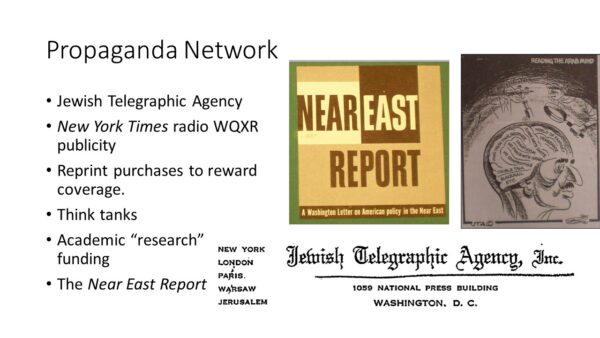
The Jewish Agency also owned the Jewish Telegraphic Agency news service. It funded public relations in the New York Times radio station and as noted funded large purchases of reprints, very important at that time to reward positive news coverage. It funded think tanks, academic research and most importantly the Near East Report lobbying newsletter. Here’s a Near East Report classic.
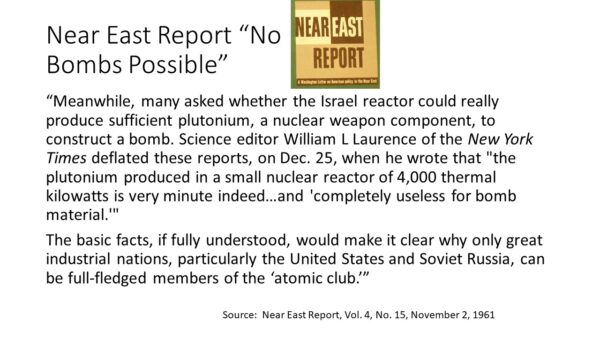
Just as Israel was getting ready to introduce nuclear weapons into the Middle East, the Israeli influence propaganda newsletter the Near East Report was telling Congress and America at large that such an event could never happen. In Volume 4, Number 15 November 2 1961 the Near East Report reported the following:
“… meanwhile many asked where the Israeli nuclear reactor [Dimona] could really produce sufficient plutonium for a nuclear weapon component. to construct a bomb science editor William L. Lawrence of the New York Times deflated these reports on December 25 when he wrote quote the plutonium produced in a small nuclear reactor of 4 000 thermal kilowatts is very minute indeed and completely useless for bomb material unquote the basic facts If fully understood would make it clear why only the great industrial Nations particularly the United States and Soviet Russia can be full-fledged members of the atomic Club.”
Near East Report
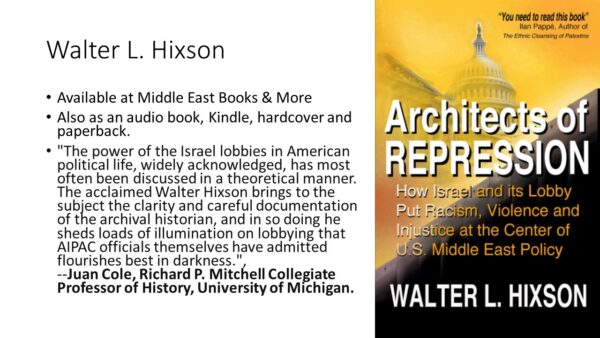
To better understand the hugely negative impact of the Jewish Agency funded Near East Report, read or listen to historian Walter L Hixson’s book Architects of Repression published in 2021 by IRmep or take a look at some of his videos on YouTube. Hixson has read just about every copy of the Near East Report and critically assesses their propaganda value to Israel.
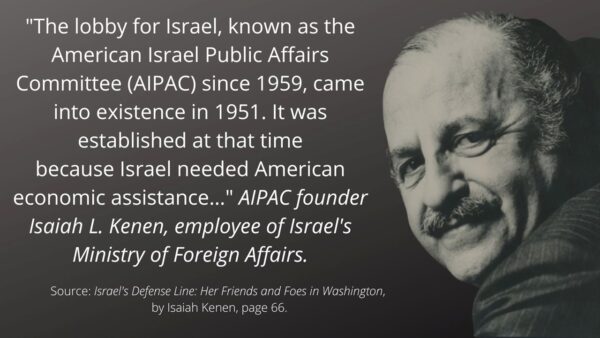
The Jewish Agency’s overall objective was foreign seed funding for an America-based foreign influence operation for Israel. What was going on was even summarized by AIPAC founder Isaiah L Kenen. He said “The lobby for Israel known as AIPAC since 1959 came into existence in 1951. It was established at that time because Israel needed American economic assistance.”
The only way Israel could get such assistance, since Israel had nothing of value to offer in return, was to set up an indestructible presence, sometimes referred to as a lobby, in the United States to influence public opinion and Congress to deliver whatever Israel needed.
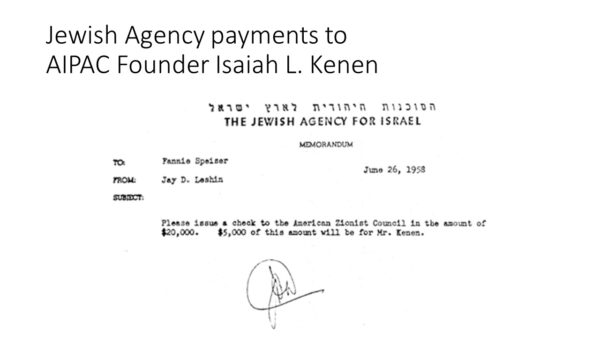
Even after AIPAC’s founder claimed to have left the employment of the Jewish Agency where he worked for quite a time, Kenen continued to receive steady funding for lobbying and PR sent direct from Israel. Even though he also claimed to have left the employment of the Israeli Ministry of Foreign Affairs, where he also worked, he continued to work for them as well and receive guidance and compensation when he was feting American political leaders in Israel.
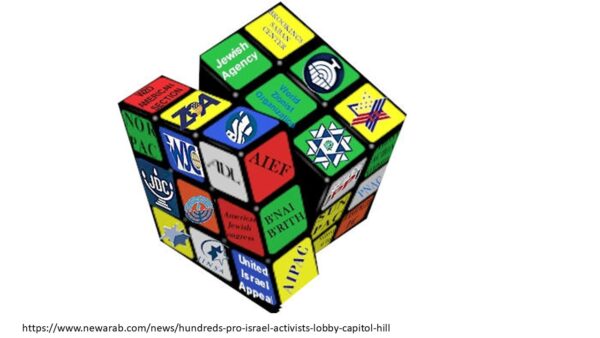
It’s easy to quickly become confused by what can seem like an ever-shifting Rubik’s cube of organizations that promote Israeli policies in the United States. For example, the American Israel Education Fund (AIEF) a tax-exempt 501c3 non-profit shell organization with no employees operated out of AIPAC, for a long time the entity was designed to collect tax deductible funding for AIPAC’s traditional annual citizen lobbying and policy conference. But the Rubik’s Cube got a Twist just last week. A political action committee directed by AIPAC in the 1980s called “NORPAC” suddenly sent 600 activists to lobby Congress for continued military and diplomatic support for Israel.
Opponents would have likely detected an AIPAC-AIEF lobbying initiative, but the NORPAC surge went almost entirely unreported and unopposed, revealing the somewhat interchangeable roles that some nodes of the lobby can take for tactical purposes.
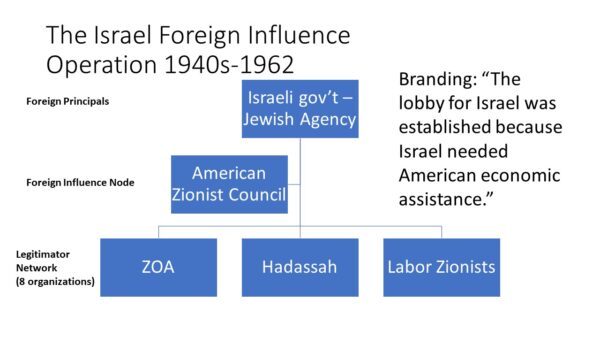
But let’s get into the structure of this operation. Taking a 30,000-foot view, it’s possible to see the real structure of foreign influence from the 1940s to 1962. At the top of the system were the foreign principals; the Israeli government and the Israeli government funded Jewish Agency. The foreign principals communicated what Israel needed and then funded the acquisition of those needs through the U.S from an influence node that was the American Zionist Council. The foreign influence node did the public relations, the lobbying, the funds redistribution, the purchase of reprints—all of the things that we mentioned.
Below it the legitimator network provided the cover that the entire operation was US-based and led many to believe the operation was “American is apple pie.” The legitimator network included the Zionist Organization of America, Hadassah (the women’s Zionist organization) and the labor Zionists, and some five others. Still, the branding was unabashedly “Israel needs this” with few attempts to justify it as an American interest. It was, as Kenen said, the lobby for Israel which was established because Israel needed American economic assistance.
But a great deal of the justification for this from the 1940s through 1962 was also aid to Holocaust refugees that undeniably needed some sort of relief. However, as we will see, the overall branding and justifications shifted over time so that by the time President Barack Obama entered office, it was a huge transgression to use the Holocaust as a justification for U.S support to Israel.
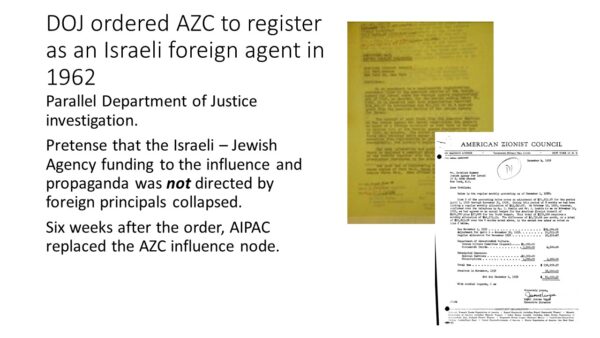
The 1940s and 1962 Israel foreign influence operation collapsed when the Senate Foreign Relations Committee [investigated] and the Department of Justice ordered the foreign influence node the American Zionist Council to register as an Israeli foreign agent under the Foreign Agents Registration Act on November 22nd 1962.
Overall the extremely well-documented funding and direction from abroad, [and] in hindsight the legitimator network was simply too weak, and the public relations and lobbying simply too blatant, to survive any heavy scrutiny—the exposure of the foreign influence nodes and their cheerful reports on receipt of Israeli funds and progress on setting up operations was not sustainable as then structured.
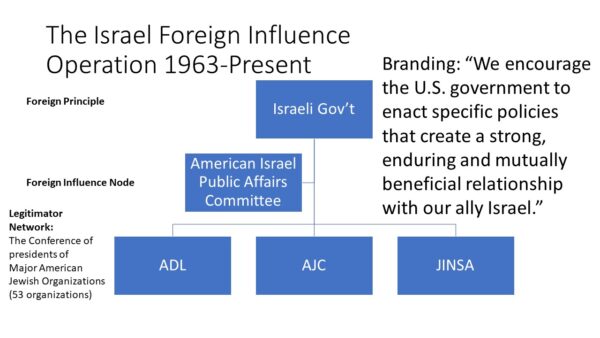
The Israeli foreign influence operation then reconstituted itself six weeks after allegedly being shut down by the Department of Justice. The foreign principals remain the same, but the new lead organization was AIPAC and the leadership fell under former Jewish Agency – Israeli Foreign Ministry employee Isaiah Kenen.
The foreign influence node branding by the 1980s emphasized that Israel was “America’s unsinkable aircraft carrier” in the Middle East and “played a vital role in U.S security.” It was no longer about what Israel needed, but rather U.S interests.
APAC has worked hard to scrub out any overt ties to the Israeli government through the 1963 reconstitution and change in their branding. Their current branding is “we encourage the U.S government to enact specific policies that create a strong enduring and mutually beneficial relationship with our ally Israel.” The single most important change is that the legitimator network has ballooned today to 53 well-funded and staffed organizations [The Conference of Presidents of Major American Jewish Organizations] from only eight in the 1960s. They raise about $1.6 billion dollars in revenue, employ 3,200 employees with 20,000 volunteers. The legitimator network includes powerful organizations such as the Anti-Defamation League [ADL], American Friends of Likud, and the Jewish National Fund.
This legitimator network could much more quickly conflate any overdue regulation or oversight as anti-Semitism, or an attack on Judaism itself, something the 1962 legitimator network had neither the power nor the funding to do. There’s some extremely fragmented opposition to this today, but no truly countervailing force anywhere near as well-resourced opposing this foreign influence operation. But there are challenges.
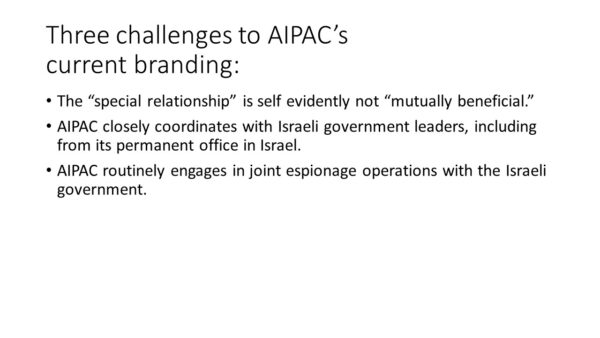
The “special relationship” is self-evidently increasingly not mutually beneficial to average Americans—only to American politicians, economic elites and Israel. For most Americans the “special relationship” is all costs, no benefit and although it claims—against all historical evidence—that it is not a foreign agent of Israel, AIPAC constantly coordinates with Israeli government leaders—including from its permanent office in Israel.
Although it strives to emphasize it’s not controlled by Israel’s government, there’s simply little daylight. However, the strongest evidence that APAC is a foreign influence operation is that it so routinely engages in joint espionage operations on behalf of and with the Israeli government and against the United States. But let’s tackle the idea that Israel is a vital U.S national security asset.
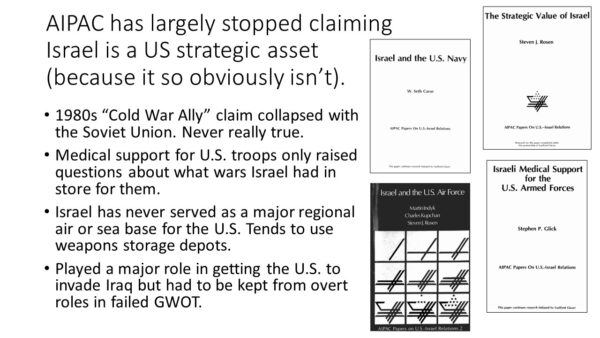
In the 1980s, AIPAC launched a series of position papers arguing that Israel was a strategic asset and vital American interest. Joe Biden, then Senator Biden, quickly picked up and parroted these talking points, as we’ll see later. However, by the 1980s, most of these assertions were falling apart. The “Cold War Ally” claim collapsed with the Soviet Union. It was never really clear how a regional nuclear power like Israel, independently able to target Moscow, and sometimes rattling a nuclear saber, would have been anything but a rogue element in any superpower confrontation.
It [AIPAC] claimed that it would be ready and able to supply medical support, see the Israeli medical support for the U.S armed forces report from AIPAC. In the 1980s medical support for U.S troops only really raised questions about what wars Israel had in store for U.S armed forces.
Israel also never really served as any sort of major regional air or sea base for the United States, as AIPAC asserted in two reports from the 1980s. Those roles went to Gulf countries such as Bahrain. Although Israel did serve to pre-position U.S military supplies in the region for the use of American troops should they become necessary, it had the habit of dipping into pre-placed U.S weapons storage depots in Israel for its operations against Palestinians and other rivals. So, it’s clear that Israel is rather something the opposite of an ally as proposed by AIPAC in the 80s.
It also played a major role in getting the U.S to invade Iraq, but then had to be kept from overt roles in the failed global war on terror.

The foreign influence operation branding now is mostly about generating positive emotional responses to Israel from U.S politicians, rather than any sort of reality-based response over what Israel actually is and does. For example, once speaker of the house Nancy Pelosi, leading a delegation of seven Democrats, including Ro Khanna, Adam Schiff and Barbara Lee, in 2022 told the Israeli Knesset and press the formation of the state of Israel was, “the greatest political achievement of the 20th century.” Not the U.S civil rights struggle, not the battle against apartheid in South Africa, or the sheer political will it took to launch a lunar exploration program, which most Americans, according to Pew Research anyway, think is the single greatest political achievement of the 20th century (alongside victory in World War II and Cold War).
No. For Nancy Pelosi it’s Israel, and we’ll look in a bit at why U.S politician policy preferences are so different than those of American voters. But the emotion-laden, rather than reality-based, policy assertions by politicians about Israel is truly bipartisan.
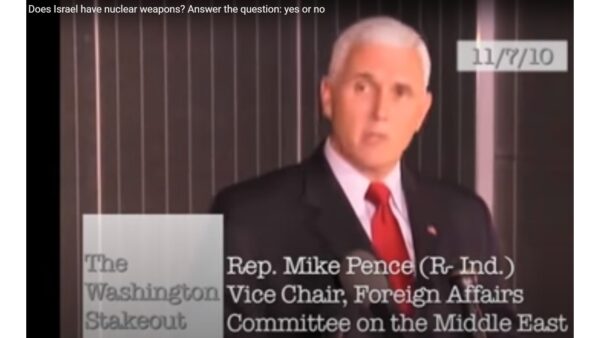
For example, when asked “yes or no, does Israel have nuclear weapons?” Senator Mike Pence, Republican of Indiana [and then] Vice chair of the Senate Foreign Relations Committee in 2010 responded with emotion rather than facts, saying “I’m aware that Israel is our most cherished ally and I strongly support Israel’s right of self-defense.” This sort of non-response is endemic.
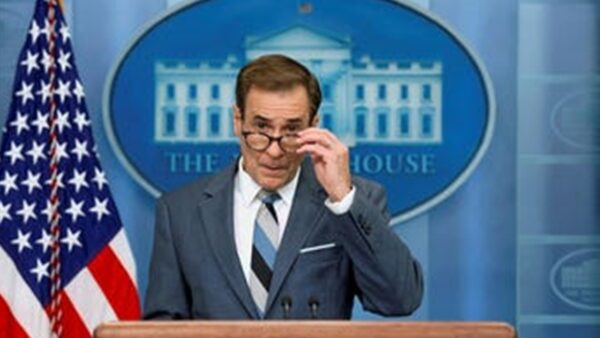
Anyone today watching White House briefings of John Kirby, Coordinator for Strategic Communications at the National Security Council, quickly grows accustomed to his incessant dodging of reporter questions about U.S policy on Israel and emotion-based responses and pledges of unconditional support. It is precisely what the Israel foreign influence operation has been working to achieve for decades—emotions-based U.S policies on Israel. There is no bigger devotee than Joe Biden, but pause for a moment.
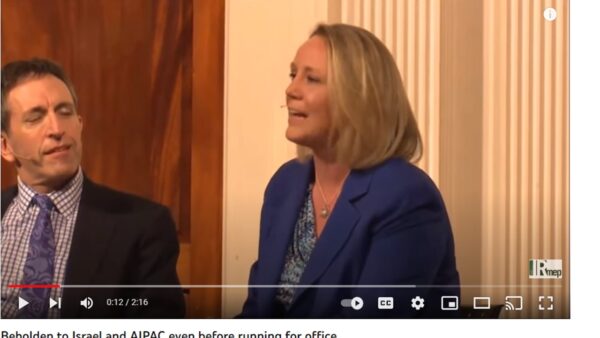
Israel’s foreign influence operation spends a great deal of time coaching politicians about how to speak about Israel as a precondition to receiving startup campaign funding. I urge you to look up the 2016 YouTube video “Beholden to Israel even before running for office.” Stephanie Schriock, an American political strategist, talks about how Israel factors into early campaign finance [and] funding.
Again, the branding for Israel shifted. The Israeli foreign influence operation informed [then President Barack] Obama he was no longer allowed to speak of Israel as a post-Holocaust refuge, as was allowed in the 60s and 70s. The Israel foreign influence operation instead insisted that Obama correct himself and start speaking emotionally about Israel as the 3000-year-old homeland of the Jewish people, which he promptly did.
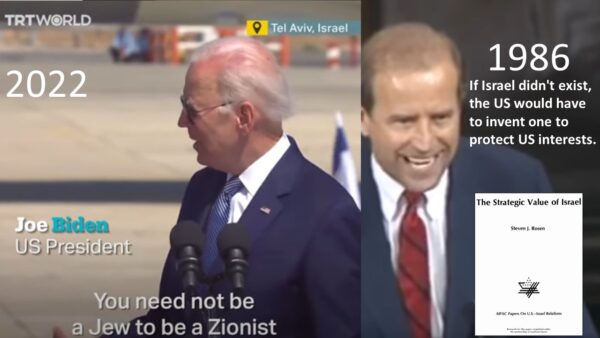
But let’s get to Joe Biden. Joe Biden has long entirely avoided tough questions about U.S policy towards Israel. Biden has quickly adjusted his talking points with shifting Israel influence operation direction, and no politician has more quickly absorbed and reiterated talking points demanded by Israel’s foreign influence operation than Joe Biden.
For example, in 1986, no doubt having read AIPAC policy papers about what a strategic asset it was, he said on C-SPAN in Congress, in the Senate, “if Israel didn’t exist, it would have to be invented to protect American interests.” He was 100 percent in line, channeling APAC.
However, by 2022, he dropped the “strategic asset” framing for a more emotion-laden and unconditional love [identity-based] approach, as a Zionist, a self-description he shares with only 24 percent of Americans according to a 2017 IRmep poll. 70.3 percent of Americans did not consider themselves to be Zionists like Joe Biden, that is when asked if they thought of themselves as a person “who believes in the development and protection of a Jewish nation in what is now Israel.” Israel’s foreign influence operation therefore spends a great deal of time coaching politicians about how to speak about Israel. And finally, coordination.
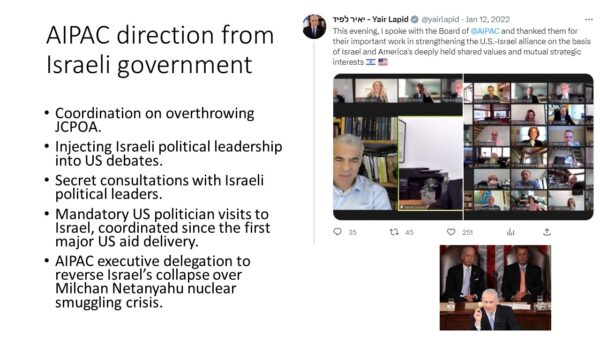
AIPAC coordinates constantly with the Israeli government. They coordinated on overthrowing the JCPOA nuclear deal, leaking of information to thwart U.S negotiations. They injected Israeli political leadership into U.S debates, such as when Netanyahu Benjamin Netanyahu was imported to address the Senate, the joint house of Congress, when Obama was president, against the JCPOA.
They have been insisting on mandatory U.S politician visits to Israel, coordinated since the very first major U.S aid delivery was sent in the early 1950s. And more recently have been strategizing to reverse Israel’s collapse over the Milchan Netanyahu nuclear smuggling crisis.
So here we have a couple of images. The top one is Yair Lapid meeting with AIPAC’S board of directors. And and you can get IRmep analysis about how a falling out over nuclear weapons technology smuggling from the U.S has led Israeli Prime Minister Benjamin Netanyahu to seek judicial reform— leading to a near civil war in Israel—in videos on IRmep.com.
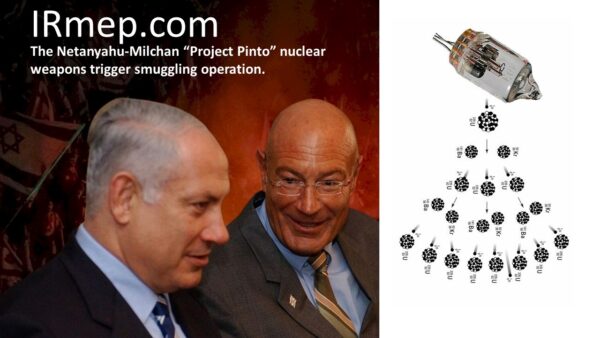
The fact that APAC leadership promptly decamped for Israel to help its foreign principals navigate rough waters back in the U.S is a matter of public record, and I encourage you to take a look at some of our recent analysis of why there is a crisis. But it’s AIPAC’S history of espionage against the United States that truly reveals it as a foreign influence operation.
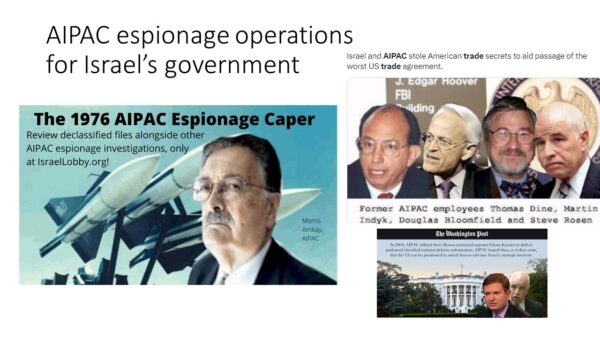
For example, in 1976 APAC director Morris Amitay stole and circulated classified National Defense Information to thwart a proposed U.S missile sale to Jordan, and almost threw Jordan into the Soviet sphere.
In 2005, APAC operatives Steve Rosen and Keith Weissman tried to parlay stolen U.S Department of Defense information into unfavorable press at the Washington Post—seeking reporter Glenn Kessler’s help—in order to pivot the U.S from Iraq into attacking Iran.
And in 1985 AIPAC and the Israeli Minister of Economics helped aid passage of America’s single worst bilateral free trade deal by stealing classified U.S information.
No legitimate U.S lobbying organization does this.
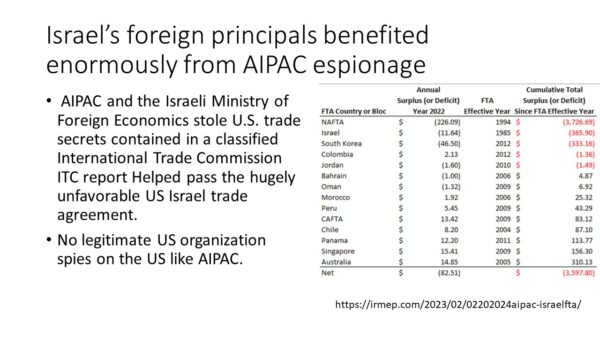
AIPAC and the Israeli Ministry of Economics stole U.S trade secrets contained in a classified International Trade Commission report, highlighting all of the U.S industry opponents’ concerns, which they used to help overcome those concerns and pass the hugely unfavorable U.S Israel free trade agreement.
The U.S Israel free trade deal has produced the highest inflation-adjusted cumulative merchandise trade deficit—now at $365.9 billion dollars—since going into effect. It’s the worst bilateral of any, and again, no legitimate U.S lobbying organization would engage in espionage partnered with a foreign government agency against American industry, all of which—virtually—were opposed to this deal.
A legitimate U.S. lobbying organization simply does not do this.
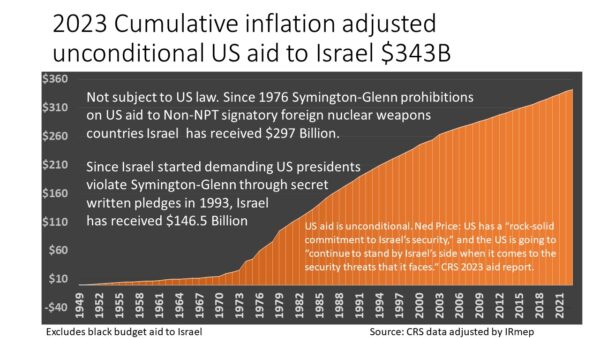
So, a foreign influence operation’s activities have resulted in Israel becoming the single largest U.S recipient of foreign aid between 1949 and 2023. The cumulative inflation-adjusted unconditional US aid to Israel is $343 billion dollars. It’s not subject to U.S laws since the 1976 Symington Glenn prohibitions on any U.S. aid to non-Nuclear non-Proliferation Treaty signatories with foreign with nuclear weapons programs—Israel has received $297 billion dollars although it IS a foreign non-NnPT signatory, nuclear weapons country.
Since Israel started demanding that U.S presidents violate Symington-Glenn through secret written pledges in 1993, Israel has received $146.5 billion dollars. And check out the reports in The New Yorker about the secret letters that every U.S president has signed since Clinton, promising to violate Symington Glenn and not raise the issue of Israeli nukes.
The aid to Israel is unconditional, as quoted in Jeremy Sharp’s annual Congressional Research Service report. The 2023 aid report, notes Ned Price saying “the U.S has a rock solid commitment to Israel’s security, and the U.S is going to continue to stand by Israel’s side when it comes to security threats that it faces.”
This aid is completely unconditional. It will be delivered no matter what Israel does or becomes.
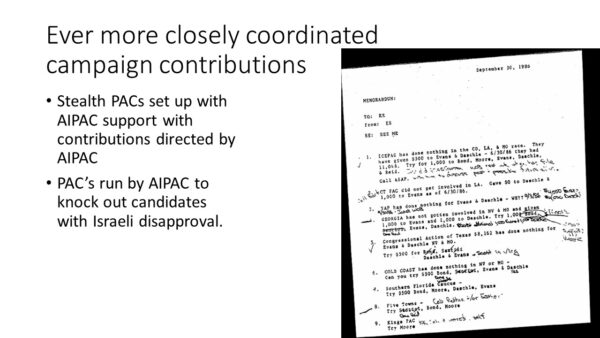
Another reason there is a foreign influence operation directed by Israel in the United States is to better coordinate campaign funding to U.S politicians. Back in the 1980s stealth political action committees [PACs] with confusing names [were] set up with the assistance of AIPAC, supported and directed by AIPAC officials, helped knock out candidates that Israel disapproved of. But as you can see from this messy letter by an APAC official directing this PAC to give this much, and that PAC to give that much, which is completely not allowed or was not allowed back in that time, run by AIPAC to knock out candidates Israel wouldn’t approve of, have vastly increased their power.
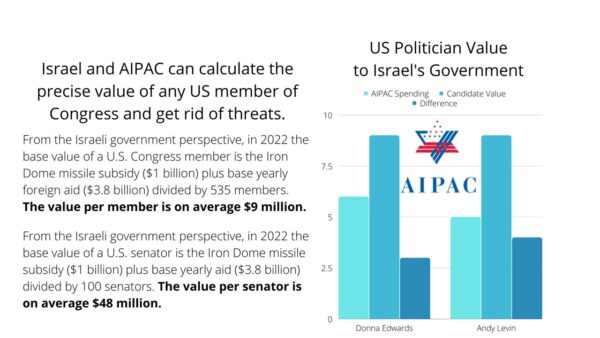
Unlike the days of Abraham Feinberg’s satchels of cash, or AIPAC’s Elizabeth Schreyer phone calls to stealth PACs, Israel’s [foreign] influence network now has coordinated—directly coordinated campaign contributions from its own operated political action committees [PACs] and so in the most recent rounds people who followed Donna Edward’s campaign or Andy Levin’s campaign could see how AIPAC’s political action committees have decimated any perceived opponents of this system by funneling campaign contributions to their opponents.
Israel and AIPAC can calculate, as can we, the precise value of any U.S member of Congress by simple arithmetic. So, if foreign aid is $3.8 billion and you divide that by 535 members, the value per member to the Israeli foreign influence network is nine million dollars. If you spend less than that to knock out someone who might oppose the aid, you’re doing well.
In the Senate the math is a bit different. Divide annual aid by 100 senators, and the value per senator is about $38 million. Spend less than that and you’re getting a discount.
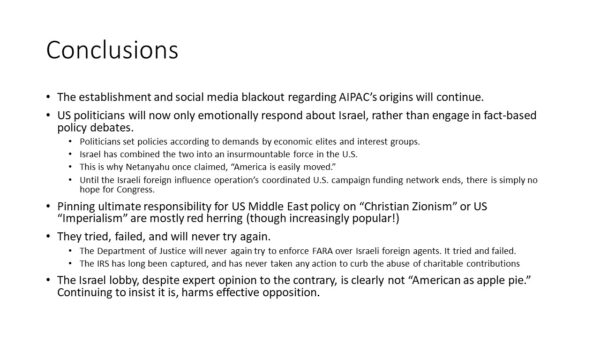
So, in conclusion, although the Senate Foreign Relations Committee on this day in the 1960s, May 23, hoped to create sunlight, there was really never any broad public awareness about the 1963 investigation due to low media coverage and government classification of key documents for a half a century.
Today there is a social and establishment media blackout about AIPAC’s real history and rise to power. That history is designated as “malinformation” at Twitter and other platforms. “Malinformation,” that is being information that’s true, that’s factual, but ruled to be intentionally conveyed in order to inflict actual harm or cause the imminent threat of actual harm on a person, organization, or country. So, this information isn’t really allowed. The truth about AIPAC’s origins and how those origins impact politics in America today are suppressed.
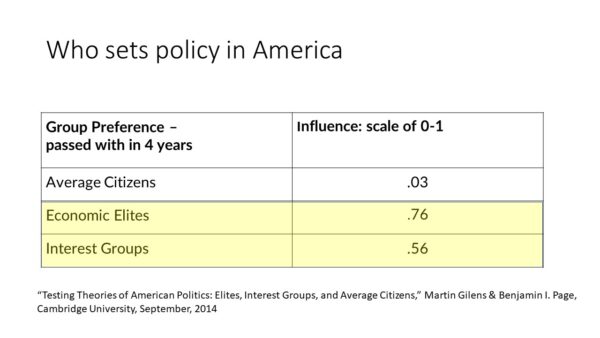
We’ve discussed how U.S politicians will now only emotionally respond about Israel, rather than engage in fact-based policy debates. But there’s some more nefarious things going on as well which we need to talk about.
There’s really no hope for most politicians to become responsive, or even sensible about, U.S policy regarding Israel. A 10-year study including public opinion poll data of the policy preferences of Americans, that is average Americans, wealthy elites, and special interest groups, revealed average citizens have almost no impact as measured by policies meeting their preferences within four years.
If average citizens want better foreign policy and don’t get it for the next four years, that factors in as “zero” in the study Testing Theories of American Politics Elites Interest Groups and Average Citizens by Martin Gilens and Benjamin Page, Cambridge University, September 2014.
Or in another example, if wealthy elites had a policy preference, such as more military aid for Israel, they had a 76 percent chance of obtaining their policy outcome within four years.
Overall, argue Gilens and Page, it is the far, far smaller number of economic elites who exert a “substantial highly significant independent impact on policy.” Israel’s foreign influence operation has the two significant segments—in yellow—arrayed against the average citizen category in my slide. The data driving the study had rows of data about AIPAC policy preferences when I reviewed it, and I also talked to Gilens, who’s a very, very interesting analyst.
Anyway, until the Israeli foreign influence operation and associated coordinated U.S campaign funding network is broken, there is simply no hope for Congress. Unfortunately for average citizens, even those who are aware enough who want change, they are also being bombarded with bad information about the true drivers of unconditional support for Israel.
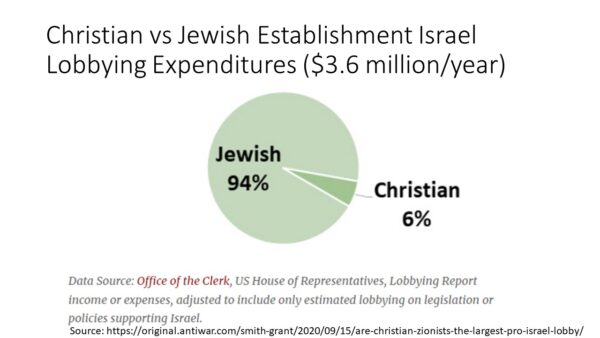
Again, as if this weren’t bad enough, pinning ultimate responsibility for U.S military or Middle East policy on imperialism and Christian Zionism are very popular today, but mostly red herring. And unfortunately, the Pied Pipers who insist to already disenfranchised average Americans that they organize into special interest groups to better address the Christian Zionists and imperialism have no effective focus for effecting change. That’s because focusing on Christian Zionists as the “key lobby for Israel in America” is a fool’s errand. Such groups, while useful in the voting booth, don’t set Israel policy in the U.S and represent only six percent of the true lobbying expenditures. In any given year, opposition based on the assumption that Christian Zionists are the generals and not the foot soldiers, fails to the delight of the Israel foreign influence operation, no doubt.
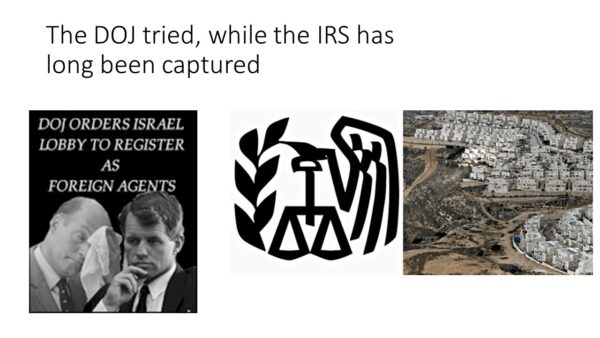
What about the regulators? In the 1960s the Department of Justice battled hard to regulate Israel’s foreign influence operation by regulating them as Israeli foreign agents, and again it lasted for about six weeks. The Justice Department failed and will clearly never again try to uphold U.S law regarding Israel.
The Department of Treasury and the IRS on the other hand, even at that time, continually stonewalled the Senate Foreign Relations Committee investigators, and even today the public, about why it ever granted tax-exempt status to Israeli foreign influence group groups operating in America but funded from abroad. The IRS basically told the Senate Foreign Relations Committee to get lost and delayed responding to requests for information until it no longer mattered. So don’t look to the Department of Justice, the Treasury Department, or the Internal Revenue Service for responses and regulation.
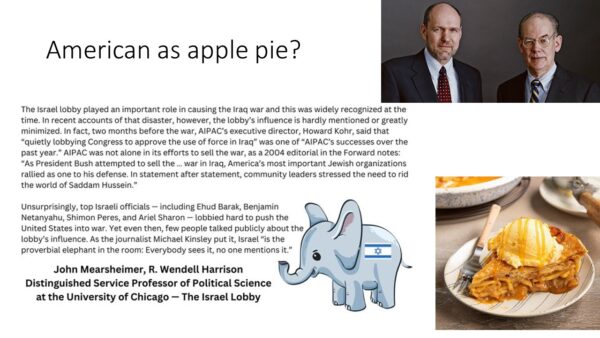
But a more nefarious red herring is the “apple pie” canard. Professors [John] Mearsheimer and {Stephen] Walt have produced stunning and highly useful analysis about Israel and U.S foreign policy, and Professor Mearsheimer’s recent reiteration of their indisputable conclusion that the Israel lobby bears a great deal of responsibility for the disastrous 2003 invasion of Iraq, is a case in point.
But their persuasive argument and opportunities it presents for sensible reform is blunted by their insistence that the Israel lobby is “American as apple pie.” It’s clearly not as American as apple pie as I have demonstrated [here and] in my new book “How Israel Made AIPAC.” Insisting that AIPAC is “American as apple pie” blunts potential focused mobilization against AIPAC as mobilization against foreign meddling. And Americans, for all their faults and historical unawareness, despise foreign meddling. The more they see the outrageous capture of government by special interest groups and elites as Israeli foreign meddling, the stronger their opposition will be.
In the face of continually emerging facts, simply ignoring the historically demonstrable massive Israeli government effort to create an American lobby for Israel is unacceptable. And on a lighter note, the Mearsheimer-Walt “apple pie” claim isn’t even a solid metaphor. That’s because apple pie is a foreign import. Apple pie was conceived in England, with influences from France, the Netherlands and the Ottoman Empire. The Americas did not even have pastry-suitable apples until European colonizers arrived.
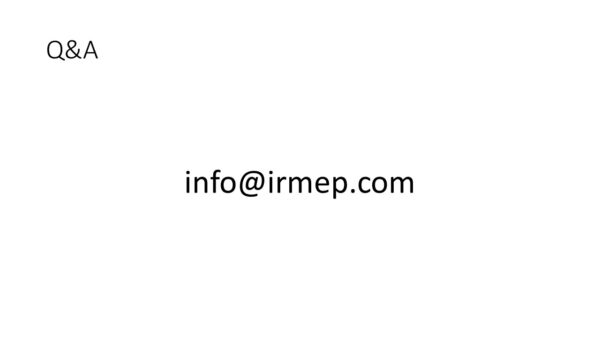
Questions and Answers
Okay, if anyone wants me to answer questions about this right now, please email them to me at info@irmep.com. And while you do that, I want you to know that you can sign up for IRmep’s email list at irmep.com/contact. And you can check out our three podcasts at irmep.com/polls/podcasts. You can also visit the Israel Lobby Archive where a lot of primary source materials [are] stored at IsraelLobby.org and you can see our books at irmep.com/books.
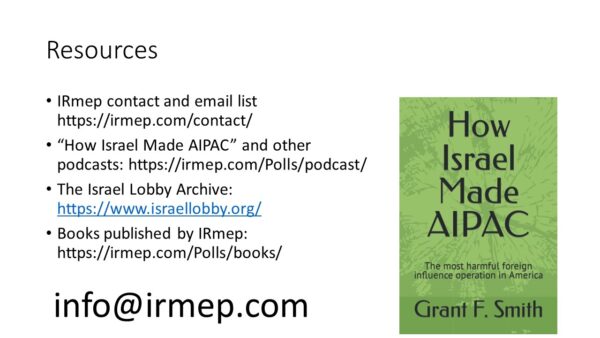
And most important of all, you can now get a copy of the book “How Israel Made AIPAC” for just twenty dollars on Amazon and other fine purveyors of books. So with that—I’m looking on my phone for emails—okay one request for a free inspection copy. Should have seen that one coming.
Okay so here’s a question. “If AIPAC is the product of Israeli and foreign funding, how do we know any of the massive amounts of U.S foreign aid are not being recycled back into AIPAC and elite coffers to lobby for more aid?”
I think that’s a very good question and one that I can’t really answer. I can say three things:
Number one is that US aid has continually been misused by Israel for illegal or prohibited activities. For example, it used U.S Atoms for Peace aid delivered by the Eisenhower administration, including know-how and nuclear reactors, for its nuclear weapons program and that’s really the opposite of what American Atoms for Peace Aid was intended for.
Israel is also prohibited from using U.S weapons to violate human rights, but it quite obviously ignores those prohibitions. And so, Israel has long used US aid for purposes it was not intended for.
A second reason is that what makes this problematic is that the U.S—under influence of Israel’s foreign influence operation—never enforces laws designed to create accountability. So, I’ve already mentioned the Symington Glenn acts that prohibit aid to nuclear weapons states that are outside the NnPT. The Department of Justice simply won’t investigate what’s happening. The Treasury has mostly become a captured agency devoted to defending Israel through sanctions. And having [personally] met with Foreign Agents Registration [Act] staff at the Justice Department, I can confirm that they’re terrified and enforcing FARA toward anything related to Israel…they would never think to investigate.
And I think number three is fungibility. US aid frees up a lot of Israeli funding that would otherwise be paying for Israel’s own defense [or in reality, offense], and that funding, that freed up funding, can go anywhere. It can go toward rewarding Israeli Americans with business opportunities, like Abe Feinberg’s Coca-Cola franchise during his operative years. It can go to Americans like Dennis Ross in the form of fat honorariums for working at the Jewish Agency, when he’s not in U.S government “service” in the U.S.
So, I would never definitively say U.S foreign aid is not being laundered back into AIPAC or the broader foreign influence operation, because like most Americans, I simply can’t get that information and the U.S government would never investigate. And there are now a million ways to secretly launder funds into U.S politics.
Here is a question from Leah, “was this session recorded, if so, can we get it?”’ Of course, it was recorded! Look on irmep.com later this evening and you will see this entire session has in fact been recorded, Leah.
And click on the podcast section you will also see that it will come out as an audio podcast, with all the laboriously read quotes from historic documents, probably later in the week. So podcast, video and as long as you’re at IRmep.com, make sure you sign up for our periodic email. We don’t send email just because a week’s gone by. We send them out when they’re needed. But we do send out information and reports and links fairly often.
Thanks Leah.
Alright, so with that I would like to thank anybody who tuned in. I encourage you to sign up for our email list and blast out the podcast and video links to any friends or associates who you think might find this information to be useful.
This is Grant F Smith, Research Director of IRmep, Thank you and goodbye.

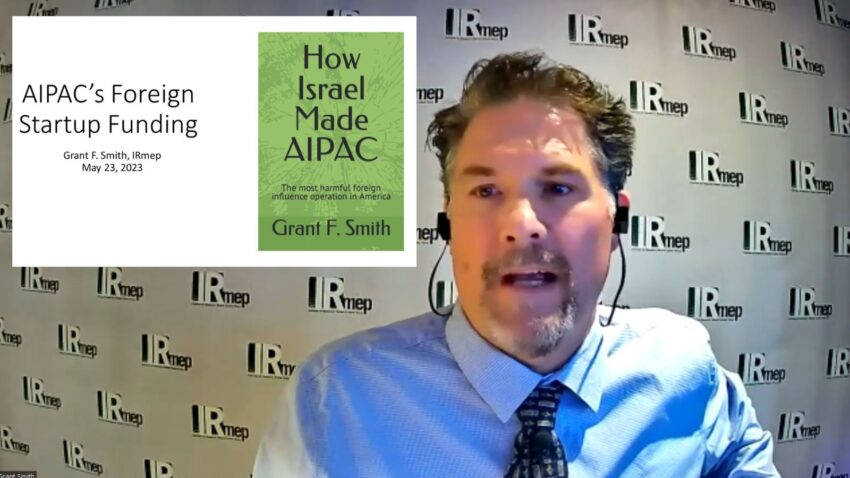
2 thoughts on “Transcript: AIPAC’s Foreign Startup Funding”
Comments are closed.